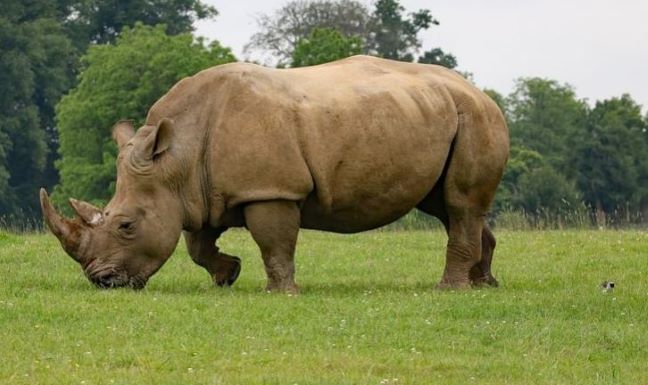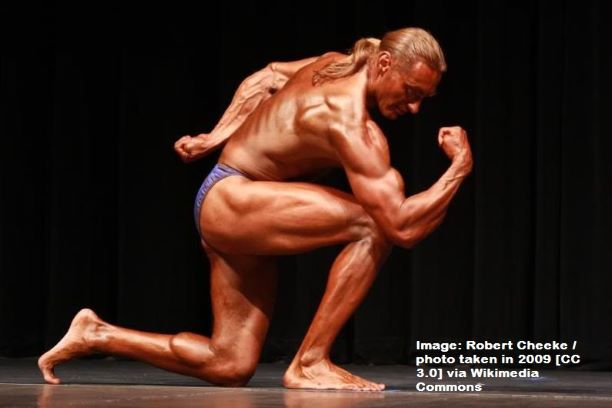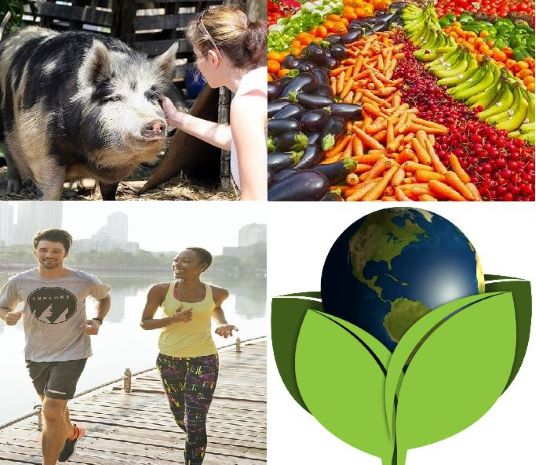
See what the 2nd largest land animal does? No worries, you don’t have to graze all day long to beef up!
While a vegan diet is well known for offering long-term health benefits apart from reducing the suffering of animals and harm to the environment, many may have one big lingering question—whether we can really build muscles on a vegan diet without animal proteins.
Luckily, the answer is a resounding YES with some real-life examples like Patrik Baboumian (Germany’s Strongest Man – 2011), Robert Cheeke (below image), Torre Washington, Alexander Dargatz, Laurel Fredette, Joel Kirkilis, Robbie Hazeley, Erin Fergus, Dominick Thompson, and Anastasia Zinchenko (powerlifter).

Good nutrition is absolutely crucial for building and maintaining muscles. This means that to a great degree, everything you put into your mouth is going to have an effect on the gains from your workouts, how quickly you recover, and of course, how you build muscles.
Let’s take a look at what you need to know about nutrition and how to get the most out of your vegan bodybuilding diet while overcoming common pitfalls vegans may experience in their bodybuilding journey.
Starting Your Vegan Bodybuilding Diet and Buff Begin With Baby Steps
In the beginning, it’s not rational to expect you’ll be able to recover quickly from heavy or very frequent training.
You will need to begin slowly, adjust your diet as required, understand how you respond to training, before seeing results as bodybuilding is not a race.
It takes time for growth, but even with a low number of reps with some heavy weights, you can still stimulate gains and be well on your way to a great physique!
Your body may not have enough calories to build muscle when it’s running at a calorie deficit, so in order to start putting on extra muscle mass, you need to eat more calories before training and make those gains. In the beginning, though, try to keep your workouts at 45 minutes or less.
Vegan bodybuilding nutrition must begin with the three important macronutrients, protein, carbohydrate, and fat which form part of your base in the bodybuilding journey.
It All Starts with Protein!
When aiming to build muscle, studies show that a diet high in proteins is certainly the way to go. As a bodybuilder, it’s important to understand what constitutes as a good vegan protein for bodybuilding.
Proteins are made out of a range of different building blocks known as amino acids. The ones which we cannot produce ourselves and must consume from the diet are called the ‘essential’ amino acids. There are nine ‘essential’ amino acids.
Three of these nine essential amino acids in particular which are vital to building muscle are known as BCAAs (branched-chain amino acids: leucine, isoleucine, and valine). BCAAs play an important role in building muscle tissue and protein synthesis.
Simply put, foods with BCAAs have greater potential for muscle growth; so it’s only sensible for you to include them in your diet while having a focus on good sources of complete & complimentary vegan proteins.
What We Need to Consider with Protein Sources
- Its amino acid profile
- Availability of essential amino acids (ideally complete protein sources)
- Availability of BCAAs*
*branched-chain amino acids: leucine, isoleucine, and valine
Best Vegan Protein Sources for Bodybuilding
Vegan Complete Protein Sources (nine essential amino acids with BCAAs)
- Quinoa
- Buckwheat
- Soy (tofu, tempeh, edamame, soy milk)
- Chia
- Ezekiel bread
- Spirulina
- Hemp
- Vegan protein powder
Vegan Protein Sources Rich in BCAAs (branched-chain amino acids)
- Peanuts
- Soybeans
- Baked beans
- Lima beans
- Lentils
- Brown rice
- Almonds
- Cashews
- Whole wheat
- Corn
Vegan Complimentary Protein Sources
- Beans and brown rice
- Peanut butter on wheat bread
- Peanut butter with oatmeal
- Hummus with whole wheat pita bread
- Whole grain cereal with soy milk
- Lentil with whole grain bread
- Salads made with beans and nuts or seeds
Other Vegan Sources Rich in Protein
- Chickpeas
- Lentils
- Almonds
- Pistachios
- Cashews
- Walnuts
- Flaxseed
- Pumpkin seeds
- Navy beans
- Kidney beans
- Mung beans
- Oats
- Natto
- Seitan
If at least 70% of your daily protein comes from high-quality protein sources like these, you’re all set for success!
But how much do you need? While there is still some debate, most reliable sources agree with the following guideline, based on your body weight:
- 1.05 to 1.4 grams per pound, or 2.3 to 3.1 grams per kilogram of body weight (intense training and muscle gains) [1]
- 0.5 to 1.05 grams per pound, or 1.2 to 2.3 grams per kilogram of body weight (intense training and maintenance)
Bodybuilders are recommended to spread this out over six small meals a day, so take your value from the equation above, and divide by six to see how much protein you should be aiming at each meal.
You can also choose a good vegan protein powder to help you meet any deficiencies, as this is a fast and easy way to keep on target.
A good option is powders made from a blend of rice & pea protein as these vegan proteins have complementary amino acid profiles that add up quite similar to what you would get from a whey protein source. For a vegan protein powder review, click here.
Carbohydrates to Fuel Your Fitness
Because carbohydrates are your muscle’s preferred form of energy, they are just as vital as protein to build muscles. Without those, you simply won’t have the sustained energy needed for your workouts.
As a general rule, the higher your carbohydrate intake, the better in your execution of weightlifting and body make-up.
So why are they so important? For intense training, carbs are crucial. Whenever your body needs energy for your workouts, its first choice to burn would be carbs. This is because they are the fastest to unlock energy (fuel).
When your body is starved of carbohydrates, it may turn to burning protein as an energy source, which is of course exactly what you don’t want as a vegan bodybuilder! You want all the available protein from your meals to be doing what it does best—building and repairing muscles and associated tissues.
You should also note that, fat produces fewer calories (energy) per unit of oxygen compared to carbs, meaning letting your body resort to other mediums of fuel during an intense workout, comes at a cost!
As a rule for the mass building phase, aim to consume at least 3 grams of carbohydrates per pound of bodyweight (for example, if your weight is 180 pounds, you should aim to eat at least 540g of carbs each day).
To keep your blood sugar levels in control, try your best to get these carbohydrates from low GI (Glycemic Index) sources. It is better for sustained performance and additional health benefits from components such as fiber, vitamins, and minerals.
Evidence suggests that these foods also result in higher levels of muscle glycogen (carbohydrate stored in the muscles), as well as a lower risk of excess glucose becoming stored as fat if you don’t use it.
Preferred “Low Glycemic” Carbohydrate Sources
- Pasta
- Brown rice
- All-bran, whole grain bread
- Sweet potato
- Quinoa
- Oats
- Nuts
- Legumes
- Most Vegetables
- Fruits (especially plums, peaches, apples, oranges, pears, grapes, and grapefruit)
- Almond milk
Fat–Aim for Roughly 30% of Overall Calories
One of the wonderful positives to a vegan diet is that natural plant fats tend to be of the healthiest kind! During mass and weight building, aim for 0.3 to 0.4 grams of fat per pound of your body weight each day.
When you are in the cutting phase (trying to lose excess fat), this figure should be lower. Conversely, when you’re in the phase of trying to gain & maintain, you might want to aim slightly higher.
Try and stick to whole food options for fat wherever possible.
Healthy Fat Sources
- Avocados
- Nuts like walnuts, almonds, macadamia, etc.
- Seeds like sesame, chia, flax, etc.
- Vegan dark chocolate
- Extra virgin olive oil
- Coconut oil
While it may take a bit of experiment before you get it just right for your individual needs, eventually balancing your macronutrients (protein, carbs, and fats) will become easy. It’s simply a matter of becoming more aware of the macronutrients your meals contain and finding where you need to make adjustments to your vegan bodybuilding diet.
Staying in a Calorie Surplus
One of the great advantages of a vegan diet for weight loss is that plant foods tend to be high in fiber and nutrients, yet low in calories. However, this would seem to be a challenge for a vegan bodybuilder trying to stay in a calorie surplus and put on weight.
Luckily, the protein and fat rich foods we mentioned above are all denser in calories, so consuming an abundance of those foods will allow you to remain in a much needed surplus for your gains.
Everyone’s body composition is different, so you will need to find the right balance. Start with a rough goal of 15 to 20 calories per pound of bodyweight each day. Start from the low value and increase if you need to.
You need to find the right zone where you’re getting the gains you want without putting on extra body fat. As long as your gains are good without putting on fat, maintain or even consider upping your calorie intake.
If on the other hand, you are experiencing more fat than muscle gain, you will need to reduce your daily caloric intake until you start seeing the results you want.
What about Micronutrients?
Once you have the correct macronutrient balance in your vegan bodybuilding diet, you also need to make sure you’re getting the health-promoting micronutrients such as vitamins and minerals. These will make sure you keep your system fit & healthy for continuous workouts and maintenance.
Below you will find the important micronutrients and vegan sources,
Vitamin B12
- Vegan B12 supplements
- Fortified plant milk
- Other fortified vegan food
- Garden of Life Raw Organic Meal Replacement (one serving provides 100% of your daily B12 and 40% of protein (20g), USDA certified organic, non-GMO and gluten-free)
Calcium
- Chia seeds
- Sesame seeds
- Tahini
- Almonds
- Spring greens
- Dried Figs
- Rocket/ arugula
- Black eyed peas
Vitamin D
- Sun exposure (absorption depends on skin color, area exposed and more suited for light colored skin types)
- Mushrooms pre-exposed to sun
- Vegan vitamin D supplements
- Plant milk
- Fortified food
- Garden of Life Raw Organic Meal Replacement (one serving provides 50% of your daily vitamin D)
The Omega-3 Fatty Acids (ALA, EPA, and DHA)
- Chia seeds
- Flaxseeds
- Flaxseed oil
- Walnuts
- Canola oil
- Hempseed oil
- Camelina oil
- Chia seed oil
- Mustard seeds
- Vegan Omega-3 Supplements (for EPA & DHA)
Iron
- Dark green leafy vegetables (oregano, parsley, basil, cooked swiss chard, and spinach)
- Vegan dark chocolate
- Cocoa powder
- Beans
- Peas
- Nuts & seeds
Zinc
- Pumpkin and squash seeds
- Sesame seeds
- Pine nuts
- Cashews
- Cocoa powder
- Vegan dark chocolate
- Vegan zinc supplements
Focus on small regular meals
Try to fit a small meal into your day, 6 to 8 times, or roughly every 2 to 4 hours, while you’re in the muscle building phase. This will help you keep a positive nitrogen balance, which is essential for producing new muscle, providing a steady stream of both calories and nutrients (protein, healthy fats and complex, low-glycemic carbohydrates).
This keeps your metabolism and fat-burning ability high, as well as fuelling muscle growth and improving recovery from your training.
Keep your hydration
As a rule of thumb, aim for around 2 liters of fluids each day which may include water, plant milk, green tea and any vegan protein shakes you may have. Use your thirst and urine color as an indicator, to keep tabs on your hydration.

Last Thoughts
Optimizing your performance and overall health for bodybuilding on a vegan diet revolves around these two key areas:
- Closely monitor and manage your vegan bodybuilding diet around generous amounts of foods high in the nutrients discussed above.
- If you are battling to meet your nutrition goals, don’t hesitate to use, quality vegan supplements.
Since your demands for nutrients have risen due to high physical activity, it may be sensible as a vegan to have a medical checkup done at least on an annual basis to know the state of your overall health.
If you know what you’re doing, it’s easy and rewarding to build muscle and strength on a vegan diet!
Remember that building a great physique takes time and commitment. You’re going to need a good deal of determination and diligence to see the results you want and remain consistent in your commitment each and every day!
In return, you’ll be rewarded with impressive results, and feel strong, healthy, and full of energy to boot.
Get the basics right, and you’re well on your way to getting awesome gains and the physique you always wanted in vegan style. As we said, “meat ain’t for rhinos!”
Disclaimer:
While every attempt has been made to verify the information provided here, the content in this post is for informational purposes only and not to be considered as professional advice. Before beginning any regimen it is advisable to seek the advice of a certified professional.
- Like
- Digg
- Del
- Tumblr
- VKontakte
- Buffer
- Love This
- Odnoklassniki
- Meneame
- Blogger
- Amazon
- Yahoo Mail
- Gmail
- AOL
- Newsvine
- HackerNews
- Evernote
- MySpace
- Mail.ru
- Viadeo
- Line
- Comments
- Yummly
- SMS
- Viber
- Telegram
- Subscribe
- Skype
- Facebook Messenger
- Kakao
- LiveJournal
- Yammer
- Edgar
- Fintel
- Mix
- Instapaper
- Copy Link
Get free updates on vegan articles, news, recipes, and much more...


Great article for us newbies! Thanks
Hey Justin, we’re so glad you found this post to be helpful. If we can be of any help with your vegan bodybuilding journey please let us know. All the best!